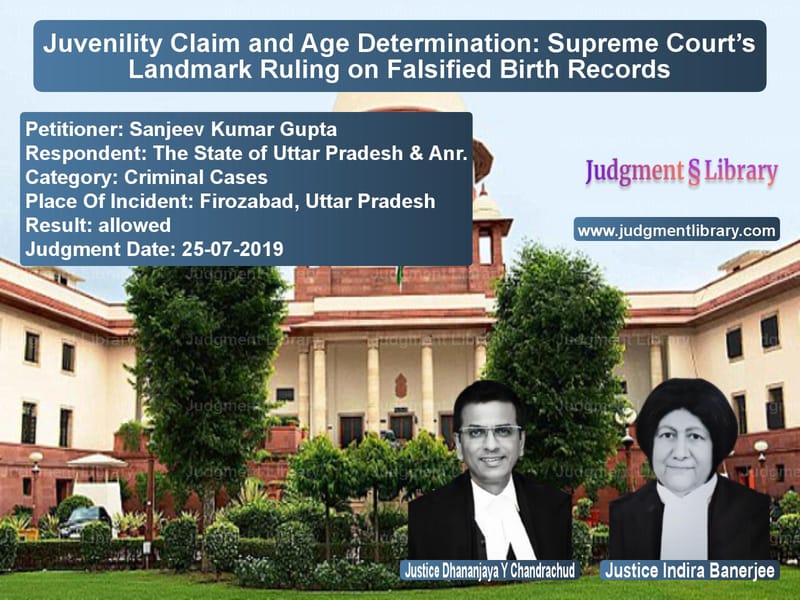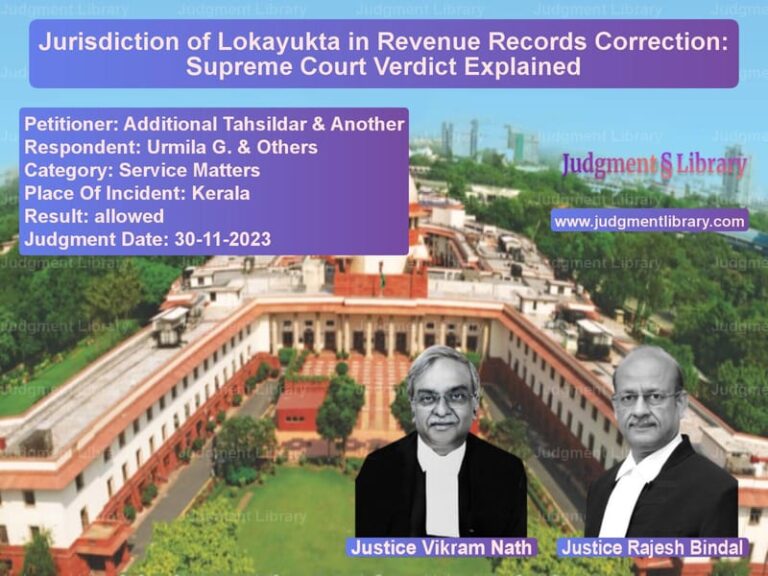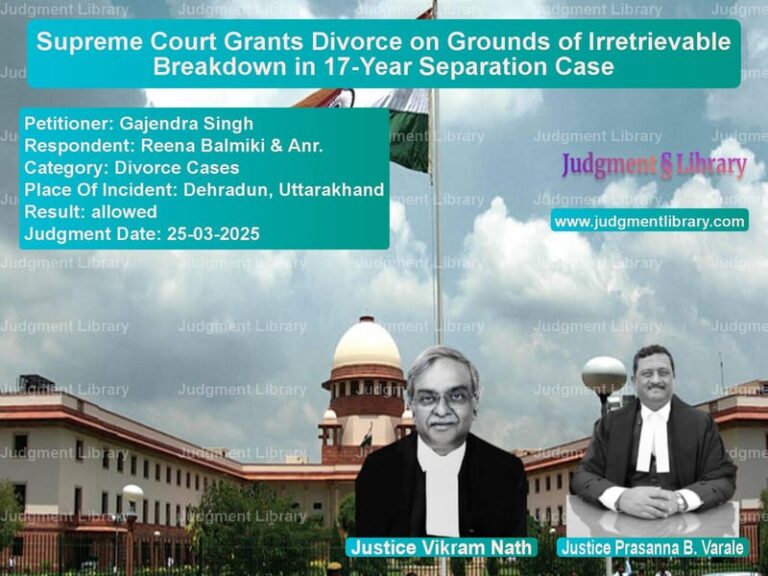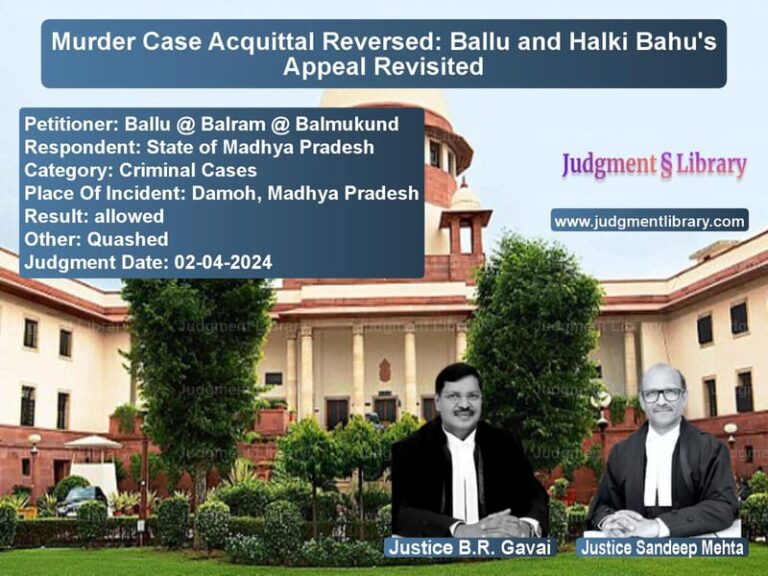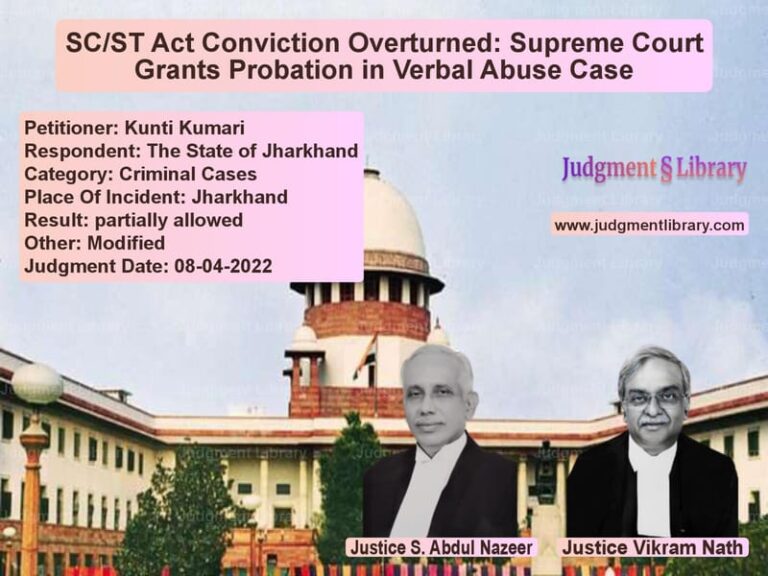Juvenility Claim and Age Determination: Supreme Court’s Landmark Ruling on Falsified Birth Records
The Supreme Court of India recently delivered a critical ruling in Sanjeev Kumar Gupta v. The State of Uttar Pradesh & Anr., addressing the contentious issue of juvenility claims and fraudulent age records. The case revolved around whether an accused individual could claim juvenile status despite contradictory birth records, and how courts should evaluate conflicting evidence in determining age.
Background of the Case
The case originated from a kidnapping and murder incident in Uttar Pradesh. On October 28, 2015, a First Information Report (FIR) was filed by the complainant, Sanjeev Kumar Gupta, alleging that his 13-year-old son was kidnapped and later murdered after a ransom demand. The accused was arrested during the investigation.
During the trial, the accused claimed that he was a minor at the time of the offense and sought protection under the Juvenile Justice (Care and Protection of Children) Act, 2000 (hereinafter referred to as the ‘JJ Act’). The claim was based on a matriculation certificate issued by the Central Board of Secondary Education (CBSE), which recorded his date of birth as December 17, 1998, making him 16 years and 10 months old at the time of the offense.
The Juvenile Justice Board (JJB) initially accepted this claim, but subsequent medical reports and official documents raised doubts about the authenticity of the birth certificate.
Key Issues Before the Supreme Court
- Whether the matriculation certificate should be given precedence over other age-determining evidence.
- Whether contradictory records, including Aadhaar, driving license, and school admission forms, could override the CBSE matriculation certificate.
- Whether the High Court was justified in overturning the Sessions Judge’s decision rejecting the claim of juvenility.
- Whether a medical examination could be used to determine age when conflicting documents exist.
Arguments by the Petitioner (Complainant)
The petitioner argued:
- The accused had provided different birth dates in various official documents, proving that the CBSE matriculation certificate was unreliable.
- The accused’s school records from Kindergarten to Class 4, as well as his Aadhaar card and driving license, all indicated his birth date as December 17, 1995.
- A medical board examination in November 2016 estimated the accused’s age at approximately 19 years.
- The accused had misrepresented his age in official records to evade legal consequences.
Arguments by the Respondents (Accused and State of Uttar Pradesh)
The defense contended:
- The matriculation certificate issued by CBSE should be considered conclusive evidence under Rule 12(3) of the Juvenile Justice Rules, 2007.
- Errors in other documents, including the Aadhaar card and driving license, could be attributed to clerical mistakes and should not override the CBSE certificate.
- The medical board’s assessment of age was only an approximation and could not conclusively determine the exact age of the accused.
- The High Court correctly prioritized the matriculation certificate and set aside the Sessions Judge’s ruling.
Supreme Court’s Judgment
The Supreme Court, in a judgment delivered by Justices Dhananjaya Y Chandrachud and Indira Banerjee, ruled against the accused’s claim of juvenility, upholding the Sessions Judge’s rejection of the plea.
On the Reliability of the Matriculation Certificate
The Court observed:
“The matriculation certificate cannot be considered conclusive when multiple official records indicate a different date of birth, especially when those records were voluntarily provided by the accused.”
It was noted that the CBSE certificate merely reflected the date of birth submitted by the school, without independent verification. The affidavit submitted by CBSE confirmed that the school had entered the date without requiring official proof.
On Conflicting Age Records
The Court ruled:
“When there are inconsistencies in official records, the benefit of doubt cannot be extended to the accused merely based on a single document. A holistic approach is necessary to prevent misuse of the juvenile justice system.”
The Court cited the principle established in Parag Bhati v. State of Uttar Pradesh (2016), which held that conflicting birth documents require additional scrutiny and cannot be resolved solely based on the matriculation certificate.
On the Role of Medical Examination
The Court upheld the validity of medical examinations in cases of contradictory age records, stating:
“Medical assessments, while not always precise, provide a reasonable estimate of age when documentary evidence is disputed. The medical board’s findings, which estimated the accused’s age to be around 19, corroborate the other official records.”
Final Verdict
The Supreme Court allowed the appeal and restored the Sessions Judge’s decision, ruling that:
- The accused was not a juvenile at the time of the offense and should be tried as an adult.
- The High Court’s decision was erroneous as it relied solely on the CBSE certificate without considering contradictory evidence.
- The accused’s claim of juvenility was an attempt to mislead the court by manipulating birth records.
Key Takeaways
- Juvenility Claims Must Be Scrutinized: Courts must examine all available records rather than accepting a single document as conclusive proof.
- Matriculation Certificates Are Not Absolute Proof: If other official documents contradict the date of birth recorded in school certificates, additional verification is required.
- Medical Assessments Have Evidentiary Value: When documentary evidence is unreliable, medical age determination tests can be used.
- Abuse of Juvenile Justice Laws Must Be Prevented: The ruling prevents accused persons from falsely claiming juvenility to escape legal consequences.
Conclusion
The Supreme Court’s ruling in this case sets a significant precedent for determining juvenility claims in criminal cases. By emphasizing a comprehensive approach to age verification, the judgment ensures that the juvenile justice system is not misused. The decision reinforces the importance of accurate record-keeping and prevents the manipulation of birth records to evade legal responsibility.
Petitioner Name: Sanjeev Kumar Gupta.Respondent Name: The State of Uttar Pradesh & Anr..Judgment By: Justice Dhananjaya Y Chandrachud, Justice Indira Banerjee.Place Of Incident: Firozabad, Uttar Pradesh.Judgment Date: 25-07-2019.
Don’t miss out on the full details! Download the complete judgment in PDF format below and gain valuable insights instantly!
Download Judgment: Sanjeev Kumar Gupta vs The State of Uttar P Supreme Court of India Judgment Dated 25-07-2019.pdf
Direct Downlaod Judgment: Direct downlaod this Judgment
See all petitions in Juvenile Justice
See all petitions in Bail and Anticipatory Bail
See all petitions in Fraud and Forgery
See all petitions in Custodial Deaths and Police Misconduct
See all petitions in Judgment by Dhananjaya Y Chandrachud
See all petitions in Judgment by Indira Banerjee
See all petitions in allowed
See all petitions in supreme court of India judgments July 2019
See all petitions in 2019 judgments
See all posts in Criminal Cases Category
See all allowed petitions in Criminal Cases Category
See all Dismissed petitions in Criminal Cases Category
See all partially allowed petitions in Criminal Cases Category

